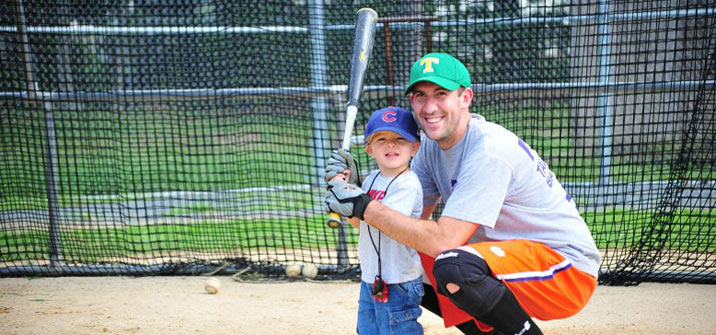The Biblical Father
by Joseph Franzese
The Bible focuses on many families and prominent fathers throughout the history of Israel. As such, Scripture is an excellent resource for understanding the proper role of a father and what it looks like in practice. That said, the practice of fatherhood cannot be reduced to a single pattern of behavior. For example, Proverbs 13:24 states that “He who withholds his rod hates his son, but he who loves him disciplines him diligently.” This statement appears to be incompatible with modern standards, yet the message is quite clear. Discipline is a central role of fatherhood. Discipline, of course, means much more than physically apprehending misbehaving children, and is crucial to the development of children. However, discipline is only a part of the great role of fathering, the effort to emulate God the Father on Earth.
It is common to describe a military as “disciplined.” This means that through much time and training, individuals within the military can effectively and efficiently complete their tasks. This same concept applies in the context of a family, Saint John Chrysostom, an early Church father, wrote a commentary on Job. In an analysis of this commentary, Douglas Finn, an Assistant Professor of Historical Theology, highlights key ideas regarding fatherhood in the book of Job, one of which is especially relevant. Chrysostom commends Job for teaching his children the importance of good family relationships. Job does this by ensuring that the family eats meals together. This cements the idea of family togetherness at in the minds of his children and encourages them to value it (Finn 280-281). Job did not coerce his children into a forced sense of family togetherness, instead he trained his children via a habit of daily family dining, conditioning them so that they continue the practice and keep the family together. This is in essence how discipline works. It is a far greater concept than instituting punishment. Discipline, much like in a military, is training someone to act a certain way and sculpt their behavior. This is what Job does with his children, and what all fathers should do with their children. In Finn’s conclusion of his analysis, he states that Chrysostom emphasizes education as a central obligation of a Christian father, and that a way to do this is to repeat Scripture heard at Church at family meals, almost giving fathers a priestly role, this will be elaborated on later.
The descriptions of good fatherly practices in Proverbs and Job are Biblically rooted, and to any Christian that means that it is fact. Secular investigations often work differently. In an article written by James Furrow for the Journal of Men’s Studies, Furrow opens his argument by stating that the “ideal father” is a “social construct” (Furrow 3). This makes it clear that Furrow is not seeing the Bible as anything more than an intellectual authority, no more valuable than any book. That said, this view of the Bible can still lead to meaningful and correct conclusions, as it is an intellectual authority as well as divine. So while the truth can be reached while viewing the Bible as purely intellectual, it will be incomplete, not necessarily incorrect. Many assertions made in the article are correct, such as that there is an element of social variation and development of the role of fatherhood over time. It is a valuable point, but is incomplete without the full truth, that the role first and foremost comes from God, not society itself. Furrow’s article is not so much a description of what a good father does and is more of an analysis of how religion impacts the societal view of an ideal father. This question is not entirely relevant as the societal perception of fathers is not the same as the Biblical role, so it will not be explored. However, a remarkably interesting and important point is raised during the argument. Furrow mentions a statement from Sigmund Freud that argues that “God was nothing more than the exalted image of an individual’s father (6).” This infers an association between someone’s experience with their father, and how they see God as a result. This prompts a look at terminology often used in Christianity, such as “God the Father.” Perhaps this connection is not unintentional. It is not uncommon to know someone who either sees God as a father figure in the absence of an earthly father, or disregards God altogether if their father is not remembered fondly. Freud’s claim that people see God as an image of their own fathers appears to hold weight, and emphasizes the importance of a greater fatherly role, besides simple discipline. In order to foster a child’s faith in God, a father must emulate God. If a father fails in projecting unto his children the true nature of God through his own actions, he can damage their faith. This failure most commonly manifests itself today as absence. In the modern world, divorce is common, and a large percentage of children are raised by single mothers. Not to say that mothers are not capable of raising children well by themselves, it is that fatherhood and motherhood are complementary and balanced, and something is lost in the absence of one parent that the other may not be able to accomplish on their own.
Another way to fail in emulating God is through abuse. While the Proverb stated in the introduction mentions a rod, in a clear reference to spanking a misbehaving child, there is a distinction between stern and abusive. A stern father not only has good intentions, but restraint. A stern father knows when physical punishment will not benefit the child and adapts accordingly, knowing that it should be a last resort. Jesus could be very blunt, and got physical when necessary, such as when He flipped the merchants’ tables in the Temple. Jesus was not violent against people – He never assaulted anyone. He overturned tables but did not attack the merchants. This is a model for good fathering, doing enough to make the point, but not causing unnecessary harm. An abusive father, however, lacks restraint and resorts to physical punishment, even violence, far more often and in situations where it is not appropriate. Instead of as a last resort an abusive father may become physical at the first sign of trouble, before even speaking to the child. This would be as if Jesus, before saying anything, had attacked one of the merchants, which first would have challenged His status as the Son of God, but would also invalidate everything He had said and done up this this point. Unnecessary violence detracts from the message and helps no one. Of course, today it is no longer acceptable to physically hit children, but the point stands. A father’s actions affect how their children will view God, so it is imperative that they are dedicated to emulating God.
Proverbs also often reference instruction as a role of fathers. “Hear, O sons, the instruction of a father, and give attention that you may gain understanding. (Proverbs 4:1).” So far it has been established that a father needs to emulate God, which includes instilling discipline, training children to value certain good things, such as family togetherness, and correct misbehavior when necessary. A father must also be a teacher. This was touched on earlier in the analysis of Job, in which Saint Chrysostom alluded to fathers engaging in a priestly role, repeating Scripture heard in Church. This is closely related to discipline, but more specific. Discipline establishes in a child general things to value and ways of acting, instruction applies this to specific situations. Much like before when the terminology of “God the Father” was discussed, it is important to acknowledge that a priest is addressed as “father.” The use of this term implies a teaching role in fatherhood. It has already been stated that a father serves as a teacher in a religious sense, such as reading Scripture to his children, hence the connection to a priest, but there is more to it than that. Life skills, in addition to Scripture, are essential. The Holy Family serves as an excellent example of this. Joseph, Jesus’ earthly father, taught Jesus his trade, carpentry. Carpenters were essential in the ancient world for building and maintaining virtually every structure in a village. It is often overlooked that Jesus did not begin his ministry until he was around thirty. Until then, he lived essentially a normal life. Jesus needed to be able to function in normal society for thirty years. Little is known about Jesus’ early life, it is not described in detail because the focus of the Gospels was his ministry, but it is highly likely that Jesus did carpentry work while living in Nazareth for many years. This was a skill taught to him by Joseph so that he could function in society effectively. Much like Joseph, modern fathers need to not only familiarize their children with Scripture, but also teach them the skills they need to be a productive member of society. A child needs to understand how to interact with people, apply for a job, and all other various specifics of life that are often not taught in schools.
The role of a father in modern society is often simply reduced to disciplinary, punishing a child when they are wrong. This undermines the role and removes from it all the greatness and higher jobs. A father is much more than a prosecutor. As evidenced by Scripture, a father must stive to emulate God. This includes raising children to value good things, such as family, and teaching them all the skills necessary for them to function in the world. This is accomplished through example, such as Job having daily family dinners to encourage his children to value family togetherness. Of course, fathers need to be stern when necessary. Following this model is imperative, because poor fathering can result in a child’s stunted faith, and an incorrect perception of God, which is dangerous.
Works Cited
Finn, Douglas. “Job as Exemplary Father according to John Chrysostom.” Journal of Early Christian Studies, vol. 26 no. 2, 2018, p. 275-305. Project MUSE, doi:10.1353/earl.2018.0021.
Furrow, James L. “The Ideal Father: Religious Narratives and the Role of Fatherhood.” Journal of Men’s Studies, vol. 7, no. 1, 1998, pp. 17. ProQuest, http://eres.regent.edu/login?url=https://www-proquest-com.ezproxy.regent.edu/scholarly-journals/ideal-father-religious-narratives-role-fatherhood/docview/222611744/se-2?accountid=13479, doi:http://dx.doi.org.ezproxy.regent.edu/10.3149/jms.0701.17
The views and opinions expressed in this post are those of the authors and do not necessarily reflect the official policy or position of Regent University.







